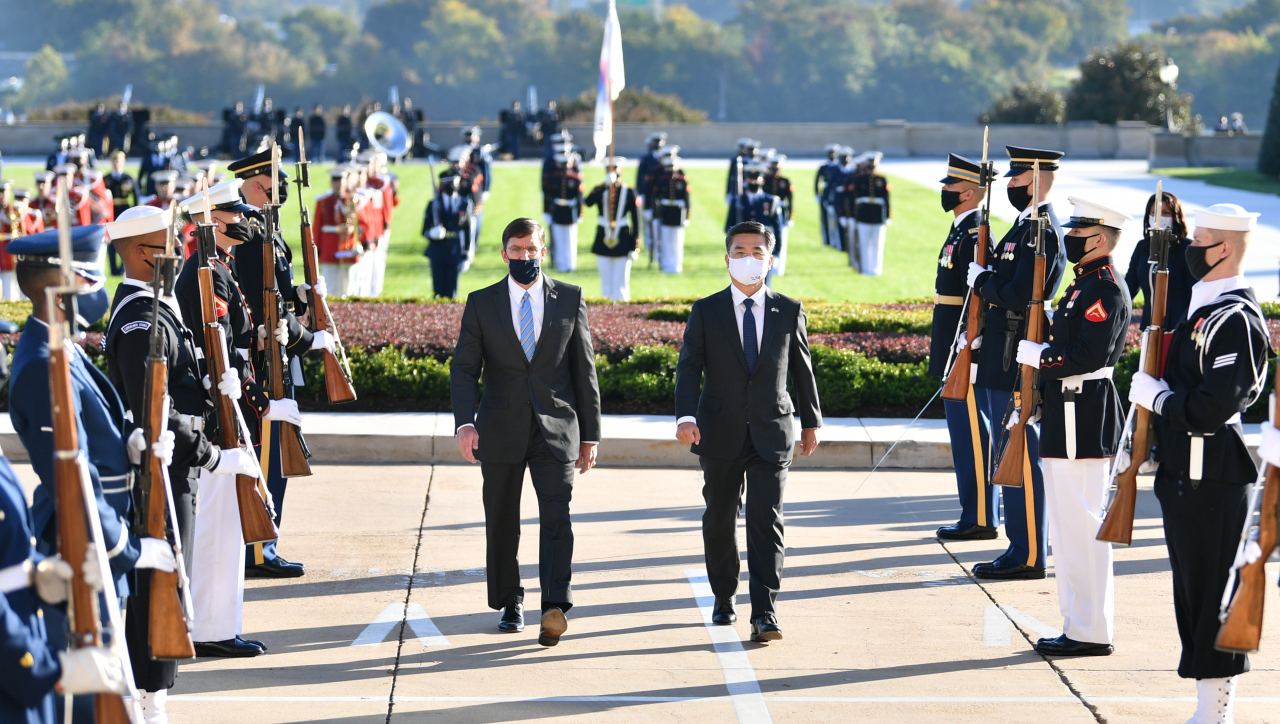Seoul, Washington differ over OPCON transfer, defense cost-sharing
By Ahn Sung-miPublished : Oct. 15, 2020 - 15:51

South Korea and the US appeared to differ over whether Seoul is ready to take over wartime operational control from Washington, casting a shadow over President Moon Jae-in’s push to regain military sovereignty by 2022.
The defense chiefs of the two allies held the Security Consultative Meeting in Washington on Wednesday (local time), discussing a range of issues, including the handover of wartime control, the stalled talks on defense cost-sharing and the North Korea situation.
At the start of the talks, South Korean Defense Minister Suh Wook stressed that the allies will work together to prepare for a combined defense system led by South Korean troops, by meeting the conditions for the OPCON transfer at an early date.
On the other hand, Defense Secretary Mark Esper said it will take time to transfer the planned wartime OPCON, which is now held by Americans, to South Koreans.
“Fully meeting all the conditions for the transition of operational control to an ROK commander will take time, but the process of doing so will strengthen our alliance,” he said, abbreviating South Korea’s official name, the Republic of Korea.
In a joint communique issued after the meeting, the two sides reaffirmed that the conditions stated in the mutually agreed conditions-based OPCON transition plan must be fully met for the transfer to take place. But the details, such as the time frame for the required tests to be conducted, were not included, raising speculation that the two sides weren’t on the same page.
The two chiefs were slated to hold a joint press conference after the talks, but the US reportedly called it off at the last minute.
The Defense Ministry here said the abrupt cancellation was due to US’ “internal issues” and not because of “any differences between the two sides,” ruling out speculation that the allies remain apart in pending issues.
Seoul aims to complete the OPCON transfer by 2022 before President Moon leaves office, with newly appointed Defense Minister Suh pledging a quick transfer of OPCON. The military has been planning to complete the FOC test, the second step in a three-phase verification process, this year, and the final phase of Full Mission Capability next year, in an effort to meet all the conditions.
But due to the scaled-back nature of the joint military exercises after the COVID-19 outbreak, they were unable to fully carry out the FOC test this year, in which a South Korean commander would have helmed the combined defense posture.
Seoul hopes to finish the FOC test next year, followed by the FMC test, to meet its self-imposed timeline. But it remains uncertain whether Washington will also agree to expedite the process, as it is emphasizing that the “conditions” must be fulfilled first before the handover. The right conditions are South Korea acquiring necessary military capabilities to lead combined defense posture, its capacity for effectively countering North Korea’s nuclear and missile threats and a stable security environment on the Korean Peninsula and in the region conducive to an OPCON transfer.
The two sides also appeared to be divided over the stalled negotiations to determine how much Seoul should pay for the upkeep of the 28,500 American troops stationed here.
In the joint release, Esper stressed that the current lack of a cost-sharing pact, known as the Special Measures Agreement, could have “lasting effects for alliance readiness if an expeditious agreement is not reached,” putting pressure on Seoul to come up with an offer that the two sides could agree on.
“We must find a more equitable means of sharing the costs of our common defense, so it doesn’t fall unequally on the American taxpayers,” Esper said in his opening remarks, expressing Washington’s unyielding stance that Seoul should pay more for defense.
Despite seven rounds of talks since last September toward renewal of the SMA, the two sides failed to clinch a deal, largely due to differences over the amount that Seoul should shoulder.
Seoul has offered to increase its share by 13 percent from last year’s SMA, when it agreed to pay around 1.04 trillion won ($874 million), but the US is said to be demanding a 50 percent hike.
Also in this year’s communique, there was no mention of Washington’s commitment to “maintain the current level of the US military personnel” in South Korea, which was included in last and previous years’ joint release, raising speculation that Washington could use a troop pullout as leverage to get its demands met in the defense cost-sharing talks.
US President Donald Trump has reportedly told US negotiators to use a possible troop cut in Korea as a bargaining chip for the SMA negotiations.
A Defense Ministry official, however, denied such speculation, saying troop withdrawl was not discussed during the talks.
By Ahn Sung-mi (sahn@heraldcorp.com)









![[Kim Seong-kon] Democracy and the future of South Korea](http://res.heraldm.com/phpwas/restmb_idxmake.php?idx=644&simg=/content/image/2024/04/16/20240416050802_0.jpg&u=)








![[KH Explains] Hyundai's full hybrid edge to pay off amid slow transition to pure EVs](http://res.heraldm.com/phpwas/restmb_idxmake.php?idx=652&simg=/content/image/2024/04/18/20240418050645_0.jpg&u=20240418181020)

![[Today’s K-pop] Zico drops snippet of collaboration with Jennie](http://res.heraldm.com/phpwas/restmb_idxmake.php?idx=642&simg=/content/image/2024/04/18/20240418050702_0.jpg&u=)